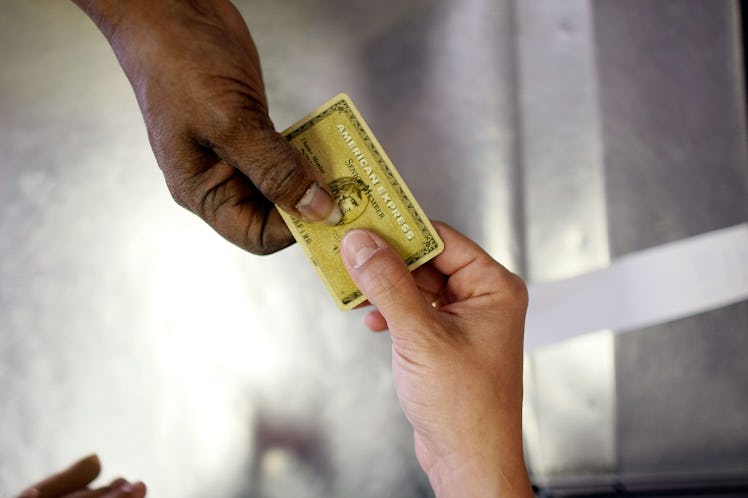
You Might Want To Consider This Before Paying Your Taxes With A Credit Card
When it comes to super helpful pieces of plastic, credit cards are pretty much at the top of the list — next to toothbrushes and those little tables that keep cheese on your pizza and off the box. They've been known to get people out of a few jams, and there's no jam quite like realizing tax season is near and your bank account is dwindling. Coming to terms with that, you might be wondering, can you pay taxes with a credit card? It's not as good as it sounds.
Attention folks, you can all breathe for a minute because you can, in fact, pay Uncle Sam with a credit card. The Internal Revenue Service (IRS) allows people to pay their income tax using a debit or a credit card. Visa, Mastercard, American Express are all options, and believe it or not you can even pay the government using PayPal. If that's not some prime 21st century stuff, I don't really know what is.
Before you get too excited, though, there is a catch. According to CreditCards.com, it's illegal for the federal government to accept payments made by credit cards directly, so instead a third-party processor is required to carry out the transaction. But, they charge a fee that could turn out pretty pricey. If you file directly through the IRS there are a few processors you can choose from and they each charge a rate of about 2 percent, according to the IRS site. But if you're using a site like TurboTax, CreditCards.com says you could be paying a fee of around 2.5 percent. So if you choose to pay your taxes by credit card, you're adding an extra fee to your total bill. And depending on how much you owe, it could add up. For example, if you owe $3,000, the fee could be around $60. While that might be worth it if you don't have the cash on hand, there's also another catch to consider.
As you probably already know, nothing's free. Credit cards are convenient, sure, but that convenience comes at a cost known as interest rates. Not only is there a fee that will be tacked on for paying by a credit card, but the longer it takes you to pay off the balance from your taxes, the larger the sum will get. According to WalletHub, the average credit card interest rate is around 14.4 percent for existing account holders. So, for instance, if you put a $3,000 tax bill on your credit card with a 14.4 percent interest rate and take a year to pay it off, you'll be adding an extra 240 bucks to your bill (and that's on top of the fee). If you need to figure out what it will cost you to pay your taxes with a credit card, Credit Karma offers a handy calculator.
As you can see, using your AMEX to pay your taxes could end up costing you a lot of extra dough. But there's another way. If that bill comes in and you can't afford to pay it, you may qualify for an installment plan through the IRS so you don't have to pay it all in full all at once. However, there's a catch there, too. Like credit card companies, the IRS also charges interest for their installment plans — which according to H&R Block, is around 5 percent. Truthfully, they could both end up costing you a pretty penny so you might want to compare those costs and see which one is cheaper.
If you decide to pay by credit card, I would say check to see what rewards you get. You never know, you might hit that post-tax sadness wall and be glad you have some travel points.